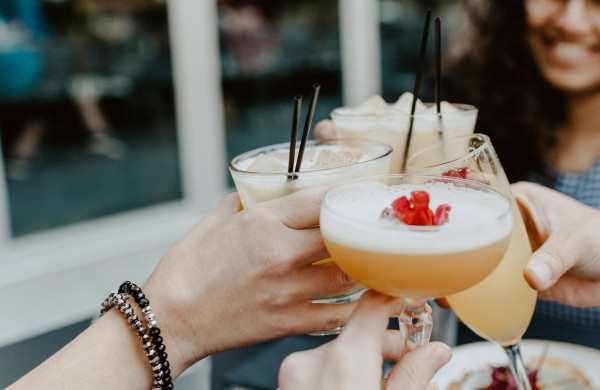June 15, 2021
Not All Heroes Wear Capes

A tribute to the consumers, producers and retailers with the courage to break norms, change the narrative and reinvent the food system as we know it
People who grew up listening to punk rock, hardcore techno or any other non-mainstream musical genre in the latter decades of the 20th century will know what it’s like to live on the fringes of society. At that time, anyone whose musical interests veered away from the carousel of label-backed artists that dominated the airways and filled the shelves of record stores was cast as a bit of an outsider. Different. Alternative.
In this age of inclusivity, it’s frustrating to see the term alternative used with negative connotations in the context of mindful consumption. People who choose to eat a plant-based or dairy-free diet, avoid foods with added sugar or abstain from alcohol are often described as pursuing alternative lifestyles, which illustrates how our ideas about what we eat are defined by a sense of the conventional.
One dictionary definition of alternative is: “existing or functioning outside the established cultural, social or economic system; different from the usual or conventional”. And isn’t that precisely the point of mindful consumption? It is outside the established system, because the established system is flawed. The challenge facing companies like Zero Percent—those that are trying to encourage mindful consumption—is to shift perceptions away from alternative being a bad thing and see it for what it is: a better alternative to the norms we have grown to accept.
SMASHING PUMPKINS
Most restaurants, like the record stores of times gone by, have perpetuated the marginalisation of alternative, often hiding a slim selection of veggie, vegan, non-diary, non-gluten menu choices amid a wealth of dishes with a broader, mass-market appeal. From bland, tokenistic meat-free offerings and an apparent inability to cater to gluten- or dairy-free diets, to unimaginative alcohol-free options on drinks lists, prejudice against alternative is hidden in plain sight.
Those of us who go to great lengths to ensure the products they consume are sustainably produced, ethically made or free from micro-plastics or pesticides have also been underserved. But the blame doesn’t lie solely with retailers and restaurants: factors such as high prices, inconsistent supply and pressure from mainstream distributors—the record labels in this analogy—to stock only their products, have all contributed to this inconvenient state of affairs in which the industry’s largest players have controlled the narrative.
But the times, they are a-changin’. Rather than accepting their status as second-class citizens, the last decade has seen mindful consumers/music lovers emerge from the darkened aisles at the back of the record store and demand that their needs are met. New technology means independent bands can sell direct to fans or leverage global platforms like Spotify to reach their intended audience, and the music world looks very different today than it did 20 years ago.
The same is true of food and beverage. Specialist diets, ethical consumption and concepts like provenance, locally grown and organic are more prevalent today than ever before, which encourages retailers to stock these kinds of products and empowers farmers and producers to make more of them. In the last few years, independent suppliers and specialist online retailers like Zero Percent have popped up to cater to this pent-up demand, disrupting traditional supply chains and offering everything imaginable to consumers who are hungry for choice.
It has taken the courage of a handful of heroes to get to where we are today.
RAGE AGAINST THE MACHINE
Historically, it’s usually the renegades that leave the longest legacy: the ones with the courage to reject the status quo and fight for a better system. Even though the odds have been stacked heavily against them, the consumers, producers and purveyors of these alternative classes of goods have stood their ground, demanded recognition and ultimately turned the tide.
I’m talking about chefs and restaurateurs who have had the courage to create meat-free, dairy-free or gluten-free menus, or to pursue nose-to-tail, farm-to-fork, root-to-petal and whole food policies; not just to meet demand, but because that’s what they believe in. The same chefs who are prepared to cut off a supplier that doesn’t meet expectations about quality, sustainability or animal welfare; or one that can’t prove the provenance of their goods or the fair treatment of their workforce.
And I’m referring to the retailers that have built businesses that buy direct from independent suppliers; and have the courage to call out or cut off producers that consistently fail to meet standards. The same retailers that have asked consumers to change their behaviour by bringing their own reusable packaging when they shop, to buy misshapen vegetables and to spend more on higher quality goods, at the same time educating them about why good food should cost more.
Then of course there are the handful of online platforms like Zero Percent, which have taken a leap of faith by catering specifically to mindful consumers, offering products that make the smallest impact on the environment and the greatest impact on health and wellbeing. Of the company’s eight pillars, two are concerned with ethical production: 0% pesticides and 0% microplastics, though you could easily add 0% meat to that list. The other pillars—0% alcohol, 0% sugar, 0% dairy, 0% gluten and natural waters—all cater to specific dietary preferences, but also acknowledge that you don’t have to make a permanent lifestyle change to dabble in mindful consumption.
After years of being shunned by mainstream distributors and retailers, the producers of these mindful products have finally found a market, and suddenly it’s a case of supply trying to catch up with demand. Zero Percent is here to sate that demand, scouring the world for the best producers and the best products that level the food and beverage playing field, providing choice and equal representation for every kind of consumer.
So it’s time to re-starch that Mohawk, dig out the studded denim and crank it up to 11: alternative is going mainstream.









